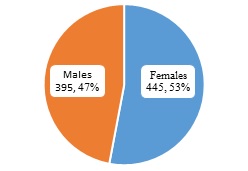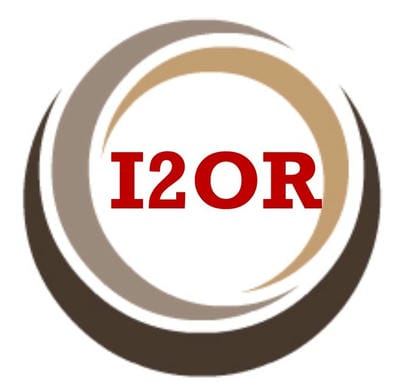A study of leave against medical advice (LAMA) in eye camp patients of ophthalmology department in a tertiary care center
Abstract
Introduction: To scientifically document and understand Leave Against Medical Advice (LAMA) characteristics of the patients selected for comprehensive eye care management from rural eye campsite.
Methods: This was a cross-sectional study, where the demographic details, diagnosis, and details of LAMA were documented and then analyzed to find out if any peculiar pattern was seen among them.
Results: Out of 840 patients over a period of 7 months, 26 (3.09 %) were seen leaving against medical advice, the majority being females (54 %). Most of the patients were in the age group of 61-70 years (42.3 %) and from long-distance camps (61.5%). They were accompanied by one of the family members (42.2%), with the majority of them leaving due to medical reasons (43.3%), seen mostly in the rainy season and festive months.
Conclusion: LAMA is an indicator of the effectiveness of the community health care delivery system. Better insight into the reason requires understanding their social, economic, cultural, and educational status. Reducing the number of LAMA patients can have a positive impact on the optimal utilization of resources and improve the health status of the community.
Downloads
References
Al Ayed I. What makes patients leave against medical advice. J Taibah Uni Med Sci. 2009;4(1):16-22. doi: 10.1016/S1658-3612(09)70077-0.
Stewart D, Bowers L. Absconding and locking ward doors: evidence from the literature. J Psych Ment Health Nurs. 2011;18(1):89-93. doi: 10.1111/j.1365-2850.2010.01622.x.
Brook M, Hilty DM, Liu W, Hu R, Frye MA. Discharge against medical advice from inpatient psychiatric treatment: A literature review. Psych Serv. 2006;57(8):1192-1198. doi: 10.1176/ps.2006.57.8.1192.
Franks P, Meldrum S, Fiscella K. Discharges against medical advice: are race/ethnicity predictors. J Gen Intern Med. 2006;21(9):955-960. doi: 10.1111/j.1525-1497.2006.00505.x.
Bowers L, Jarrett M, Clark N, Kiyimba F, McFarlane L. Determinants of absconding by patients on acute psychiatric wards. J Adv Nurs. 2000;32(3):644-649. doi: 10.1046/j.1365-2648.2000.01523.x.
Vincent C, Phillips A, Young M. Why do people sue doctors? A study of patients and relatives taking legal action. The Lancet. 1994;343(8913):1609-1613. doi: 10.1016/s0140-6736(94)93062-7.
Moyse HS. Discharges against medical advice: a community hospital’s experience. Can J Rural Med. 2004;9(3): 148-153.
Khisty N, Raval N, Dhadphale M, Kale K, Javadekar A. A prospective study of patients absconding from a general hospital psychiatry unit in a developing country. J Psychiatr Ment Health Nurs. 200;15(6):458-464. doi: 10.1111/j.1365-2850.2008.01249.x.
Saitz R, Ghali WA, Moskowitz MA. Characteristics of patients with pneumonia who are discharged from hospitals against medical advice. Am J Med. 1999;107(5);507-509. doi: 10.1016/s0002-9343(99)00262-4.
Smith HM. Factors leading to frequent readmission to Valkenberg Hospital for patients suffering from severe mental illnesses (Doctoral dissertation, University of the Western Cape). Available at https://core.ac.uk/download/pdf/58912948.pdf.
Stone MH. The fate of borderline patients: Successful outcome and psychiatric practice. Guilford Press; 1990 May 4.
Hayat AA, Ahmed MM, Minhas FA. Patients leaving against medical advice: an inpatient psychiatric hospital-based study. J Coll Physicians Surg Pak. 2013;23(5):342-346.
Brook M, Hilty DM, Liu W, Hu R, Frye MA. Discharge against medical advice from inpatient psychiatric treatment: a literature review. Psychiatr Serv. 2006;57(8):1192-1198. doi: 10.1176/ps.2006.57.8.1192.
Popoola SO, Onyemaechi NO, Kortor JN, Oluwadiya KS. Leave against medical advice (LAMA) from in-patient orthopaedic treatment. SA Orthopaed J. 2013;12(3):58-61.
Duno R, Pousa E, Sans J, Tolosa C, Ruiz A. Discharge against medical advice at a general hospital in Catalonia. Gen Hosp Psychiatry. 2003;25(1):46-50. doi: 10.1016/s0163-8343(02)00253-0.
Jeffer EK. Against medical advice: Part I, A Review of the Literature. Mil Med. 1993;158(2):69-73.
Alfandre DJ. I'm going home: discharges against medical advice. Mayo Clin Proc. 2009;84(3):255-260.
Holden P, Vogtsberger KN, Mohl PC, Fuller DS. Patients who leave the hospital against medical advice: the role of the psychiatric consultant. Psychosomatics. 1989:30(4):396-404. doi: 10.1016/S0033-3182(89)72245-3.
Akiode O, Musa AA, Shonubi AM, Salami BA, Oyelekan AA. Trends of discharges against medical advice in a suburban surgical practice in Nigeria. Trop Doct. 2005;35(1):51-52.

Copyright (c) 2020 Author (s). Published by Siddharth Health Research and Social Welfare Society

This work is licensed under a Creative Commons Attribution 4.0 International License.


 OAI - Open Archives Initiative
OAI - Open Archives Initiative



















 Therapoid
Therapoid

